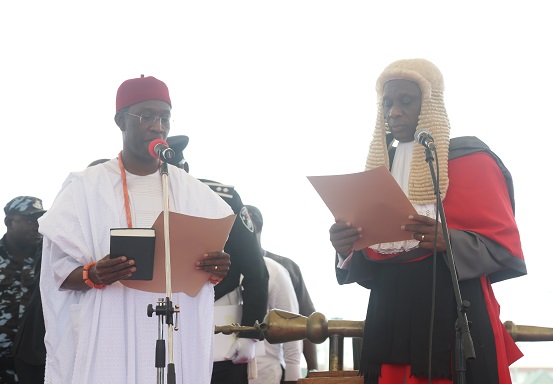... says Academics are Patriots.
... argues that Nigeria must grow rapidly to achieve vision 2020.
Professor Milton Iyoha is a World Class Professor. A product of the University of Yale, Prof. Iyoha was an Assistant Professor of Economics at the State University of New York at Buffalo from 1970 to 1975. A former Research Fellow at the Brookings Institution in Washington D.C., he joined the department of Economics and Statistics, University of Benin as a Senior Lecturer and pioneer Head of Department in 1975 and rose to the rank of full Professor in 1980.
He is also a former Dean of the Faculty of Social Sciences in the same University. He has served as a Consultant to the IMF, ILO, AERC, the World Bank, the United Nations Development Fund, UNECA, the West African Monetary Institute, WAIFEM, the NCEMA and many others. In this interview with the Economist Nigeria, he bares his mind on burning national economic issues and proffers solutions to the country's perennial economic challenges.
Thursday, 13 August 2015
Friday, 31 July 2015
Why India matters
Two weeks from now, India will celebrate 68 years of independence from the British rule. Indeed, these are exciting times for India! Because for instance, even though very few economies were projected by the IMF to grow at rates above 6% this year, India was tipped to grow at 7.5%! The country is projected to beat China for the second year running as the fastest-growing economy in the world.
Thursday, 2 July 2015
Okowa’s prospect of a Delta beyond oil
by Obodo Ejiro
“We
still love James Ibori. He did a lot to help our people,” my father, a clergy
man said to me, as he pointed to roads within the Warri metropolis constructed by
the former Delta State governor, now incarcerated for fraud.
“As
for Emmanuel Uduaghan, we are not so impressed. People all over Delta, from
Agbor to Ugborikoko, are complaining. We don’t know where he is taking us,” he added.
Wednesday, 1 July 2015
Who moved our cheese?
by Obodo
Ejiro
Decline
in oil price (and subsequently, government budgets) often predates economic decline
in Nigeria. Proposed states and federal budgets for 2015 confirmed this position
earlier this year.
In
2014, 33 of Nigeria’s 36 states budgeted higher than what they spent in 2013.
But in 2015, only 9 states had higher budgets compared to what they spent in
2014. (Twenty-seven states budgeted considerably less than what they spent in 2014
for 2015.)
While
state budgets rose by 13% in 2014, they dropped by 5.3% in 2015. The federal budget
for 2015 rose by only 4.3% over what was spent in 2014, which amounted to a
considerable drop compared to the 2013/2014 period.
Wednesday, 24 June 2015
Its back
A policy designed to develop local capacity in vehicle
manufacturing impacts stakeholders differently, writes OBODO EJIRO.
“This government has made business bad for us,” says Billy
Kanayo, a used-car dealer at the Berger area of Lagos State. “Tell me, where
are the cars government claims are being assembled in Nigeria?”
“Does Olusegun Agangan, Minister of Trade and Investment,
drive in such cars,” another dealer who pleaded anonymity asks, as he laments
the impact of the new National Automotive Policy (NAP) of the Federal
Government on his business.
Saturday, Saturday Medicine
by Obodo Ejiro
During the week, she works as a
cashier at a new generation bank in Lagos while he works as a shopkeeper at a
small shop in Abeokuta, but at weekends, they are classmates at the University
of Lagos. This is how tertiary remedial or part-time programmes bring people
together across Nigeria weekly.
Thursday, 18 June 2015
Competitive analysis of the hair relaxer market
Demand side dynamics
The value and volume of hair relaxer purchased in Nigeria has declined considerably in the last one and half decade because of the growing popularity and acceptance of weaves. (Most females, especially those in the working class, say weaves last longer and are cheaper to maintain.)
The value and volume of hair relaxer purchased in Nigeria has declined considerably in the last one and half decade because of the growing popularity and acceptance of weaves. (Most females, especially those in the working class, say weaves last longer and are cheaper to maintain.)
Subscribe to:
Posts (Atom)






